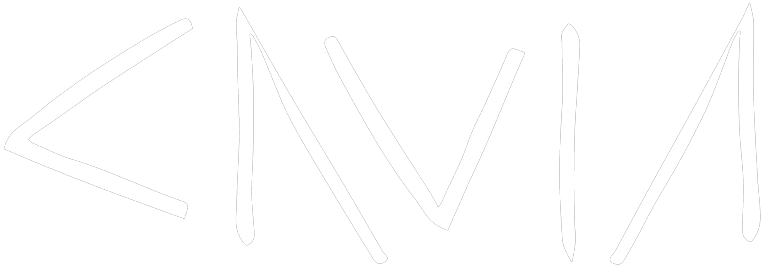19 & 20 mei
Songs of Mourning
By Asian Movie Night
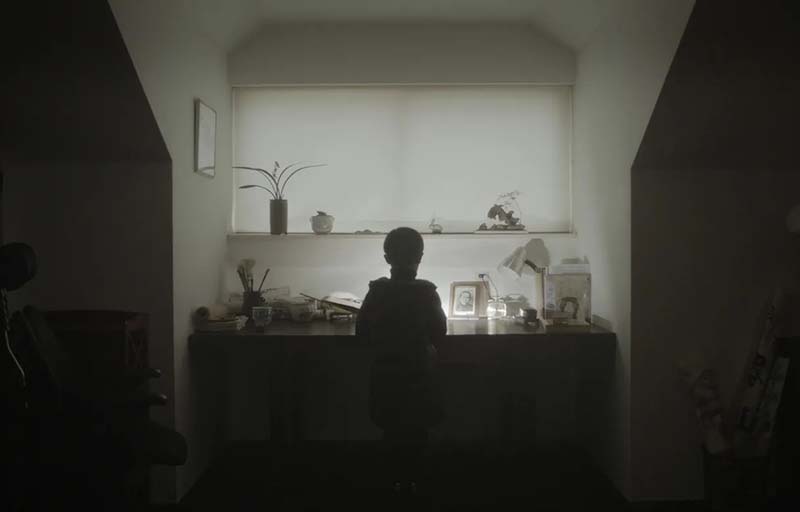
EN Together with Asian Movie Night based in Arhem, Filmhuis Cavia will screen selected films for two nights. In this year’s opening programme titled Songs of Mourning, Asian Movie Night presents four films that take us on a poetic journey into questions that art has been trying to grasp since the beginning of time, meditating on death, mourning and loss, or even healing, strength and joy, each in its own unique tune.
Coming spring, let’s talk about death. Yes, death. Though we rarely put its name in our mouths, it follows closely behind our every mundane action, in the news, on our table, the edges of our bodies, as an inseparable part of life.
How do we encounter death?
In the magical realist short Together Apart (2019, CN), a woman finds her husband wandering around their house soon after his funeral. In the feature film Ode to Nothing (2018, PH), we follow an embalmer and her unusual encounter with an older woman’s corpse. -1287 (2014, JP) is a moving documentary that follows Kazuko as she comes to terms with her oncoming death and her thoughts on life, love, and money. Finally, Jinpa (2018, CN) is a Tibetan-language film on a stoic truck driver and his fateful encounter with a goat and a hitchhiker on a morbid mission. The four selections encounter death in the face of diverse cultural contexts and narratives, going beyond the taboo.
Together Apart, Jinpa, -1287 will be screened in Amsterdam’s Filmhuis Cavia on May 19th and 20th, and Ode to Nothing will be shown in Arnhem at Focus Filmtheatre on May 31st. Join us after the screening of -1287 in Amsterdam on May 20th, where there will be a talk with Mourning School’s initiator Lucie Gottlieb.
Vrijdag 19 mei, 20:30
SPECIAL
Songs of Mourning: Together Apart + Jinpa
Together Apart
Qu Youjia | 2020 | China | 45’ | EN subs
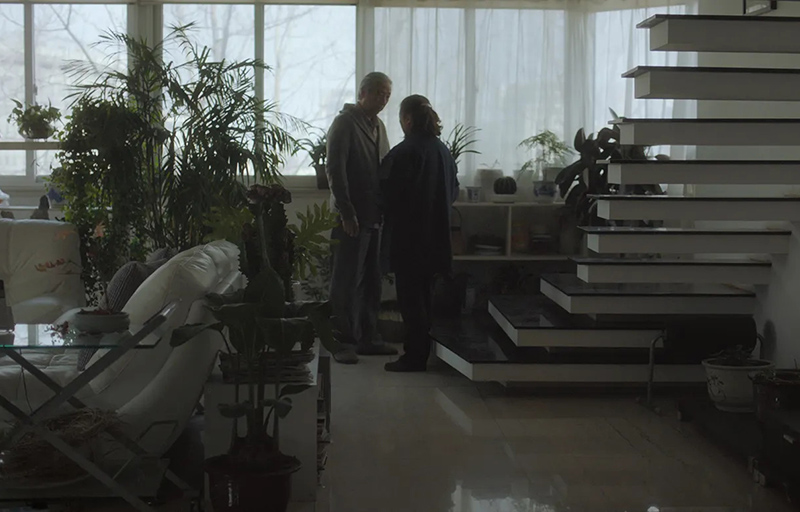
NL Bij een Chinese uitvaart komt heel wat kijken: een driedaagse wake en diverse rituelen gaan aan de crematie vooraf. En toch: als in de openingsbeelden van deze magisch-realistische film de weduwe na afloop van de ceremonie vermoeid het huis aan kant begint te maken, komt haar overleden man de trap af stiefelen alsof er niets is gebeurd. Gelaten valt ook zij al gauw terug in ingesleten patronen: ze kleedt hem warm aan, meet zijn bloeddruk en kibbelt met hem. Het absurde gegeven ontwikkelt zich verder wanneer er meer bezoek van gene zijde in aantocht blijkt te zijn, en ook de dochter zich met de zaak gaat bemoeien. Terwijl zij een oplossing zoekt voor de onmogelijke situatie, lijkt kleinzoon Jiajia de enige die opa’s terugkeer onvoorwaardelijk omarmt. Dit alles is vervat in lange, beheerste takes vol onderkoelde humor en tedere reflecties op familie, eenzaamheid, herinnering en het verstrijken van de tijd.
EN Chinese funerals require much preparation: a three-day wake and various rituals precede the cremation. In the opening shots of this magical realist film, the widow returns home drained and starts tidying up the house, only to encounter her deceased husband casually sauntering down the stairs. She soon readopts a familiar routine: dressing him warmly, measuring his blood pressure and bickering with him. This absurd premise soon develops when visitors from the afterlife are expected and the daughter starts getting involved. As she seeks to solve the impossible situation, grandson Jiajia seems to be the only one unquestioningly embracing grandad's return. All shot in long, composed takes, replete with understated humour and tender reflections on family, loneliness, memory and the passing of time.
+
Jinpa
Pema Tseden | 2018 | Tibet | 86’ | EN subs
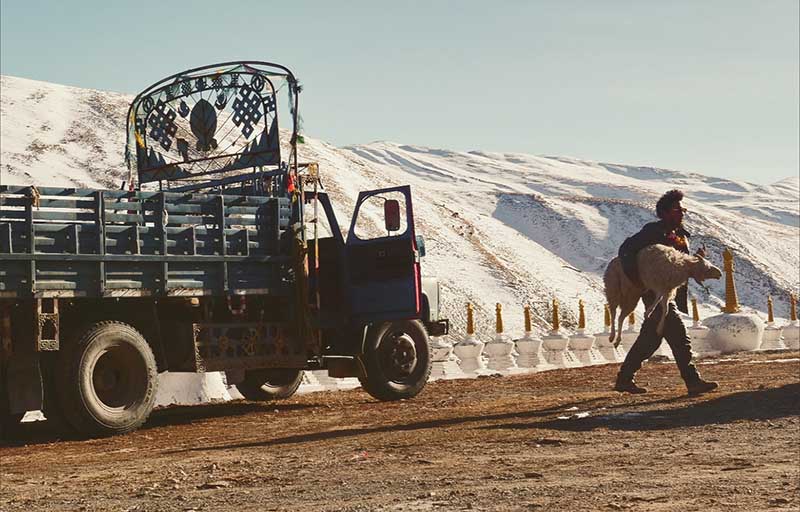
NL Op een afgelegen weg die door de uitgestrekte kale vlaktes van Tibet loopt komt een vrachtwagenchauffeur, die per ongeluk een schaap heeft aangereden, een jonge man tegen die aan het liften is. Terwijl ze rijden en kletsen, merkt de vrachtwagenchauffeur dat zijn nieuwe vriend een zilveren dolk aan zijn been heeft vastgebonden. Hij begint te begrijpen dat de man erop uit is om iemand te vermoorden die hem eerder in zijn leven onrecht heeft aangedaan. Terwijl hij de lifter afzet bij een splitsing in de weg, realiseert de vrachtwagenchauffeur zich niet dat hun korte tijd samen alles heeft veranderd en dat hun lot onverbiddelijk met elkaar verweven is.
EN On an isolated road passing through the vast barren plains of Tibet, a truck driver, who has accidentally run over a sheep, chances upon a young man, who is hitching a ride. As they drive and chat, the truck driver notices that his new friend has a silver dagger strapped to his leg. He comes to understand that his man is out to kill someone, who wronged him earlier in life. As he drops the hitchhiker off at a fork in the road, little does the truck driver realize that their short time together has changed everything, and that their destinies are inexorably intertwined.
Zaterdag 20 mei, 20:30
SPECIAL
Songs of Mourning: -1287
+ Q&A with director & Mourning School
-1287
Thomas Ash | 2014 | Japan | 70’ | EN subs
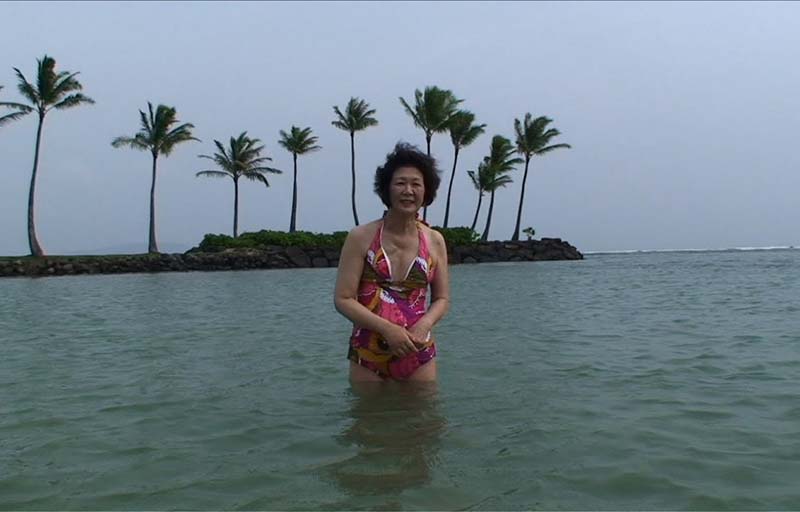
NL Tijdens zeer intieme gesprekken met de filmmaker nadat ze heeft vernomen dat ze gaat sterven, daagt Kazuko culturele en sociale normen uit door openhartig te spreken over haar eigen leven en dood, terwijl ze worstelt met wat het betekent om eerlijk te zijn en gelukkig te leven. Terwijl ze het einde van haar leven nadert ontwikkelt Kazuko door observaties over liefde, geld, huwelijk en dood een diepere intimiteit met zowel zichzelf als de filmmaker, terwijl ze de kijkers uitnodigt om diep na te denken over hun eigen leven. En de dood.
EN During deeply intimate conversations with the filmmaker after she learns she is going to die, Kazuko challenges cultural and social norms speaking candidly about her own life and death while she grapples with what it means to be honest and live happily. As she nears the end of her life, through observations about love, money, marriage and death, Kazuko develops a deeper intimacy both with herself and the filmmaker, while inviting the viewer to deeply consider their own life. And death.
Afterwards there will be a talk with the director of the film, Thomas Ash, and Mourning School’s initiator Lucie Gottlieb.
Mourning School is an artistic study program on the notion of being in grief as the stuff of our everyday life, initiated by Lucie Gottlieb and Rosa Paardenkooper. In a series of exhibitions, public programming and publications, we imagine new ways of collective mourning to give name to, and make space for the feelings that come with death, dying, loss and mourning. The vulnerability of life – threatened by climate, health, political, social and economic crises resulting in inequity and precarity, loneliness and isolation – makes the proximity to death and loss more tangible. Central to Mourning School lies the question: who gets to live and die, who is remembered and who is deemed ungrievable? In response, Mourning School proposes queerness, in its most expansive form, as a method and framework to subvert and unsettle Western understanding and norms of death and mourning – as an individual problem or medical diagnosis – and the stigma that surrounds them.
